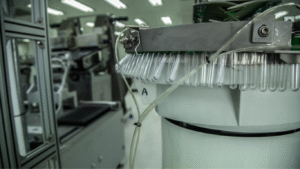Running a successful firm requires structure, consistency, and strong organizational habits. Without the right systems in place, even the most promising businesses can quickly lose focus, struggle with inefficiencies, and fall behind competitors. Staying organized enhances day-to-day productivity and helps create long-term stability and growth. By developing strategies that streamline processes, improve communication, and foster accountability, business leaders can ensure their firms remain on track and ready to adapt to challenges. Here are six smart ways to keep your firm running smoothly and aligned with its goals.
Establish Clear Processes and Standard Operating Procedures
Every successful firm thrives on clarity. Establishing standard operating procedures (SOPs) ensures that tasks are performed consistently, regardless of who handles them. For example, creating detailed guidelines for client onboarding, financial reporting, or project management minimizes confusion and reduces mistakes. SOPs serve as training tools for new employees, helping them get up to speed quickly. When processes are clearly documented and easily accessible, the firm becomes less reliant on individual memory and more resilient. A strong foundation of clear processes promotes efficiency and ensures that everyone understands their responsibilities.
Leverage Technology for Better Workflow Management
Technology plays a crucial role in improving efficiency and keeping firms organized. Project management apps and cloud-based storage systems help teams track tasks, deadlines, and responsibilities, ensuring nothing falls through the cracks. Many organizations streamline their operations more effectively when Factor A/E is an intuitive firm management platform integrated into daily workflows, allowing tasks, documents, and communications to stay centralized. Automated reminders and collaboration tools further reduce confusion, while seamless access to information enhances team coordination. By embracing these solutions, firms can save time, reduce errors, and focus more on strategic growth initiatives.
Foster Effective Communication Within Teams
Miscommunication is a common cause of organizational breakdowns. A firm that prioritizes clear, consistent communication creates a culture where employees feel informed, aligned, and motivated. This can be achieved through regular team meetings, progress check-ins, and open-door policies that encourage transparency. Encouraging feedback and active listening helps address problems early before they escalate. By fostering communication channels across departments, firms reduce silos and promote collaboration. When information flows seamlessly, projects progress more smoothly, employees remain engaged, and clients receive better service. Effective communication is about creating an environment of trust and clarity.
Implement Strong Time and Task Management Practices
Time is one of the most valuable resources in business, and managing it well is important for keeping a firm organized. Encouraging employees to prioritize tasks, set realistic deadlines, and use calendars or digital planners helps prevent bottlenecks. Time-blocking techniques and productivity tools can boost efficiency by reducing distractions and ensuring focus on critical tasks. Leaders should model healthy time management practices by avoiding unnecessary meetings and respecting boundaries. When everyone in the firm values time and manages it responsibly, projects are completed on schedule, workloads are balanced, and stress levels are reduced.

Prioritize Financial Organization and Accountability
A firm cannot remain on track without strong financial management. Establishing clear accounting systems, tracking expenses, and maintaining up-to-date financial records are crucial for long-term sustainability. Using accounting software can simplify invoicing, payroll, and expense tracking, ensuring accuracy and compliance. Regular financial reviews and audits help leaders identify potential risks or inefficiencies before they escalate. Creating budgets and sticking to them fosters accountability across the organization. A financially organized firm can better allocate resources, invest in growth opportunities, and remain resilient during challenging times. By keeping finances transparent and well-managed, leaders ensure the firm operates from a position of strength.
Build a Culture of Continuous Improvement
The most organized firms recognize that systems and strategies must evolve. Creating a culture of continuous improvement encourages employees to identify inefficiencies and suggest better approaches. Regularly reviewing workflows, gathering team feedback, and adapting to industry changes keep the firm agile and competitive. Leaders should celebrate progress and reward innovation, reinforcing the idea that organization is not about rigidity but about adaptability. A culture that embraces growth ensures that the firm stays on track even as markets, technology, and client needs shift. By embedding continuous improvement into the organizational DNA, firms remain stable and future-ready.
Keeping a firm organized is an ongoing process that requires commitment, planning, and adaptability. From creating clear processes and leveraging technology to fostering communication and prioritizing finances, these strategies help build a strong foundation for long-term success. More than just tools or policies, an effective organization is about cultivating a culture where everyone values structure, accountability, and improvement. By adopting these smart practices, business leaders can ensure their firms remain focused, resilient, and prepared to thrive in an ever-changing environment.
Article received via email































